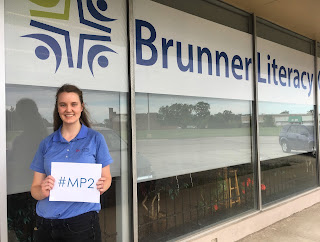Love of Languages....and People!
Our Marianist PULSE (#MP2) blogger is Kateri, from Dayton, Ohio. Kateri is serving a second year with PULSE at the Brunner Literacy Center.
I first
learned to love other languages in a simple, three room home in Managua,
Nicaragua during a college immersion trip. There, Señora Lopez insisted
on calling me her daughter for the week and praised my feeble attempts at
speaking Spanish. My host siblings laughed with me at my grammatical
mistakes and showed only patience when I asked clarifying questions during
their stories. On our last night together, we took time to admire the moon and
stars and the fact that I had the same ones at home. After experiencing
Spanish as a means of forming human connection, rather than a conglomerate of
complex verb tenses, I was able to return home and purposefully declare Spanish
my second major.
Most ESOL (English for Speakers of Other Languages) students I’ve encountered at the BLC, however, approach language learning for a variety of complex reasons – not just the simple passion and connection I was privileged to experience. Several BLC students have come to the U.S. as refugees, balancing myriad daunting responsibilities and challenges while striving to learn. Some have never stepped foot in a school. I’ve heard a refugee’s experience of resettlement in a foreign place described as being told to step out of a window and trust that you will be caught.
How does one approach ESOL tutoring in the presence of intense pressures, when defeatism or minimalism may seem the obvious response for some learners? The only possibility is to go little by little, one step at a time. At its core, ESOL is a creative way of meeting people where they are. It means acknowledging the largeness of students’ tasks and affirming progress of all kinds.
Whenever given the opportunity to tutor ESOL, I strive to create an environment
of welcome and fun, where people can feel free to enter the vulnerability
implicit in learning a new language. I encourage laughter as a response to the
inevitable goof-ups in pronunciation, grammar, and vocabulary. Wherever
possible, I try to foster opportunities to form connections, rather than
presenting English as an overbearing task.



Comments
Post a Comment